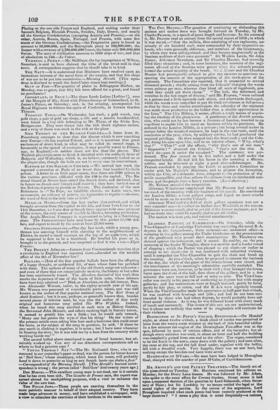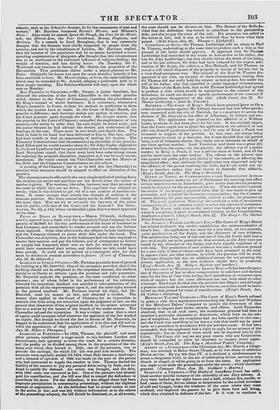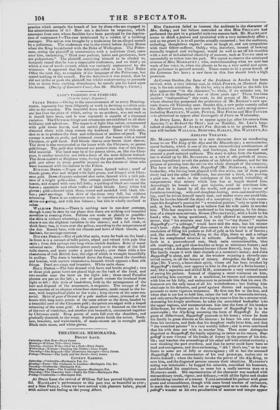MR. ARNOLD'S AND THE PATENT THEATRES.—The fourth act of ,
this piece closed on Tuesday. Mr. Harrison continued his address on Monday, for the Drury Lane lessees. He was followed by Mr. Adam, who spoke to the same effect for Covent Garden. Great stress is laid upon a supposed decision of the question by Lord Sidmouth, when Secre- tary of State ; but his Lordship by no means settled the legal or the moral rights of the parties. In the course of the argument, Lord Brougham inquired what stock pieces had been recently produced at the. large theatres ? " I mean a play that is acted frequently-4 rations
the King's counsel or senior barristers. It is customary, whenever a Thomas Lethbridge v. Earl St. Vincent.) . i practice. (King's Bench, Jan. 25. The King v. Steward.)
tenant then applied to the Court of Chancery for an injunction to MERCHANT TAILORS' Coltraary.—The Court of King's Bench refused restrain him from suing out execution upon the judgment at law, on the to grant a rule for a mandamus commanding the Master and Wardens ground that the-waiver of the original landlord to his tenant amounted of the Merchant Tailors' Company to permit the liverymen of that also to a waiver by the tenant of the breach of the under-tenant. The Company to inspect their books, records, and affairs. Lord Tenterden Chancellor refused the injunction. It was a vulgar notion that a court observed, that in all such cases, the mandamus granted had been to of equity could interpose relief wherever the operation of the law worked examine a particular document or documents, which bore on the sub- an injury. But though he found the law in favour of Mr. Dunwich, he ject of complaint ; but the complaint had not been specific in this case ; begged to be understood that his application of it in this case did not in- and the Court was unwilling to lay down a rule that could not be acted volve the approbation of that person's conduct. (Court of Chancery, upon as a precedent in accordance with the previous cases. It had been
Jan. 26. Hillier v. Thompson.) contended, that the applicants had a right to apply for an account of the
LIABILITY OF PARTNERS.—In 1823, Thomas, the plaintiff, and some expenditure ; but an abuse of trust could not be inquired into by this other persons, established a stage-coach to run between London and Court. The Court, did not see any good reason why any Corporation Stroudwater, each agreeing to horse the coach for a certain distance, should be compelled to allow its members to inspect every paper. and the profits to be divided among them in the proportion of the dis- (King's Bench, Jan. 28. The King v. Merchant Tailors' Company.) tance over which they horsed it. Dale, one of the partners was to ARREST OF A CLERGYMAN:OR Christmas day, Mr. Harris, a clergy- provide the carriage for which 15/. 15s. was paid him monthly. The man, was arrested in Baker Street Chapel, as he was about to celebrate accounts were regularly settled till 1824, when Dale became a bankrupt; Divine service. By the 9th Geo. IV. it is declared a misdemeanour to and a demand of upwards of 100/. was made on the part of the person arrest a clergyman while in the act of celebrating divine service in any who had contracted to supply the coaches to him. Thomas denied the church or chapel, or while going to or from the same. An application liability of the concern to pay any personal debts owing by Dale, and re- was made to set aside the proceedings under the arrest ; which the Court fused to satisfy the demand. An action was brought, and the debt, granted. (Common Pleas, Jan. 26. Goddard v. Harris.) with 100/. costs, was recovered at law. One of the partners had already STARVENTG A VERDICT.—The Duchyof Lancaster Court has exist- paid his contribution, and the bill was filed to compel the defendant to bited another painful instance of the absurdity of our Jury scheme. A t ontribute- his share. For the defendant, it was alleged there had been Jury were locked up for eight hours and a half, without fire, candle, or improper precipitation in commencing proceedings, without the slightest food ; some of them, driven almost to desperation by the united torments attempt at negotiation. As the defendant had no proper notice to join of cold and hunger, broke the windows of the room where they were in the action at law, and was left without information as to the course confined, and implored the passers by to give them food and firing, ef the proceedings adopted, the bill should be dismissed, or, at accents, which they obtained in defiance of the law. Is it wise to continue a comedy, each as the School for Scandal, fit for the amusement of men and the costs should not be thrown on him. The Master of the Rolls Se- . women." Mr. Harrison instanced Byron's Werner, and Milman's cided that the defendant was bonnd to contribute to the partnership Fazio ! Afterwards he named Speed the Plough, the Cure for the Heart- debt, and also to pay the costs of the suit. His attention was called' to ache, the Heir-at-Law, the Poor Gentleman, Brutus, Firginius, and the action at law, and it was to be inferred that he knew what then Bertram. To a remark by Lord Brougham, that it was commonly passed. (Rolls Court, Jan. 26. Thomas v. Litchfield.) ,. thought that the theatres were chiefly supported by people from the CONDITIONS OF SALE.—Sir Thomas Lethbridge sold an estate to Karl country, and not by the inhabitants of Loudon, Mr. Harrison replied, St. Vincent, undertaking at the same time to produce such a title as the that the increase of the population had by no means furnished a corre- counsel of the latter should approve. It appeared that Sir Themes spending augmentation of playgoers. He thought that this circumstance Lethbridge had succeeded to the estate as heir-at-law to his father, the was to be attributed to the combined influence of religious feeling, the late Sir John Lethbridge ; but that shortly before the death of the latter, weight of taxation, and late dining hours. On Tuesday, Sir C. and in his last sickness Sir John had been induced by the urgent Ai. Wetherell was facetious in favour of Mr. Morris, the proprietor of the citation of Mr. Leigh, sickness, solicitor, a Miss Bicknell, and Sir Thomas, to Haymarket. That gentleman claims under a patent granted to Mr. cancel a will which disposed of the property in favour of his son, but in Foote. Originally his house was open for seven months ; latterly it has a very disadvantageous way. The counsel of the Earl St. Vincent dis- been restricted to four. Mr. Morris claims at least, the same indulgence approved of the title, on account of these circumstances ; stating, that which may be extended to Mr. Arnold, alleging a preferable title to it Sir Thomas did not really hold the estates as heir-at-law, but under the from longer standing. The Solicitor-General will reply upon the whole will of his father, who had cancelled it under improper circumstances. case on Monday. The Master of the Rolls held, that as Sir Thomas Lethbridge had agreed BAD PRACTICE IN CHANCERY.—Mr. Cooper, a junior barrister, has to produce a title which should be satisfactory to the counsel of the directed the attention of the Lord Chancellor to the unfair practice defendant, he could not decree a specific performance of the contract if which obtains in the Court of Chancery, regarding the precedence of that gentleman disapproved of the title. (Rolls Court, Jan. 27. Sir King's counsel is in Court, to hear his motions in preference to those BRTBERY.—The Court of King's Bench have granted Ifave to file a which the juniors have to make. In the Court of King's Bench, the criminal information against Mr. Edward Steward and four -otter gentle- practree is different ; each barrister makes one motion in rotation, and men connected with the city of Norwich, for a conspiracy to secure the the Court proceeds again through the whole. Mr. Cooper stated, that election of Mr. Steward to the office of Alderman, by bribery and car- the practice in the Court of Chancery compelled the employment of two imption. The application was granted oil the affidavit of a Williani counsel,—the senior in order that the case might be heard early, and Lamb, to whom 5/. had been given for his vote. It was strongly urged, the junior because he had advised the motion and understood all the that the Court ought not to grant the application on the affidavit of one bearings of the case. There must be two briefs, and double fees. The who was himself particeps eriminis ; and the case of King v. Peach was brief he held in his hand had been delivered to him in May last, and he instanced in support of the position. In that case, the charge being had been unable to find an opportunity of making his motion. The a conspiracy to cheat at a foot-race, the Court decided that the parties Chancery Commissioners had recommended an alteration of the practice. being a set. of infamous cheats, they ought not to interpose on behalf of Lord Eldon said he would consider about it Sir John Copley objected to one cheat against another. Lord tenterden said there was a great dif- it ; butLord Lyndhurst ha d not perceived the value of his former objection. ference between the cases,—in the present, the offence was of a public Lord Brougham stated, that there must have been some strong reason nattrre; in King v. Peach, it was a private cheat or fraud, and all the
the Rolls and the Chancery Commissioners on the subject. magisterial office ; and, although the application was supported only by A meeting of the Chancery bar is to be held this day (Saturday) to the affidavit of the person receiving the bribe, the Court could not re- consider what measures should be adopted to effect an alteration of the fuse to interfere unless they saw reason to discredit that affidavit.
The alterationrnaybe effected by the very simple method of setting down EFFECT OF NOTICE BY COMMISSIONERS UNDER IMPROVEMENT ACTS■ the motions (as causes and petitions are set down) when the notice of The Commissioners under an act of Parliament for carrying into effect motion is given. The motions, like other business, may then proceed in certain improvements in Manchester, gave notice that certain premises the order in which they are set down. This expedient was adopted re- would be required for the purposes of tile act. \nen the notice expired, cently, when it was desired to get rid of a vast number of ancient mu- the owner of the property apprized them that he was ready to give up tions. It seems strange that nobody has thought of making it the possession, and required the necessary compensation ; but the Commis- common practice. But then; counsel must not be in different courts at sinners deeming his price unreasonable, refused to take his premises at the same, time. How are we to reconcile the interests of the suitor all. The party applied on Thursday for a rule for a writ of mandamus and the public, with that of the Court and the Counsel ? See SPEC- commanding tfieiti to summon a jury to assess the amount of compeesa- TA TOR, No. 52, p.412, where we detailed a plan that was much approved tion. The Conn held, that as the notice was binding on the party to at the time. whom it was given, it must be considered binding on the Coinmisioners. PneoF OF DEBTS IN Basertuercia—Messrs. Dilworth, Arlington, Application granted. (King's Bench, Jan. 27. The King v. The Market and Co. entered into a bond with the Lancashire Canal Company in the Street Coninziscionees.) penalty of 20,000/. for the due performance of the duties of treasurer to Sr. ANDREW'S PARISH AND Galy's INN.—The Court of King's Bench that Company, and particularly to render accounts and pay the balance has refused to disturb the verdict establishing the extraparochiality of when required. Some time afterwards, the obligors became bankrupts, Gray's Inn. An application was made for a new trial, on two grounds, and the Company claimed to prove their debt under the bond. The —the misdirection of the Judge, and the discovery of new evidence. Chancellor was of opinion that as the bankrApts had not been required to The misdirection being one of fact and not of law, the Court held that a render their account and pay the balance, and of consequence no failure new trial ought not to be granted on that account, as the Jury were not to comply had happened, there was no debt for which the Company Wind by the direction of the Judge, and were equally cognizant of it could have commenced their action, and therefore no debt could have with him. The production of new evidence was not a sufficient ground been proved. It could not be proved as a contingent debt, for that for a new trial, if that evidence could have been produced at the trial. must be debitztin in presenti solvendwn in falitro. (Court of Chancery, It appears there are other actions, in which the question will be tried. practice which compels the breach of law by those who are engaged in the administration of it ? How can a decision be respected, which emanates from men whose faculties have been paralysed by the deprive- tion of sustenance P—The case terminated by a verdict of a farthing damages. The action was brought by a tradesman for an alleged assault by a policeman. The tradesman was in the crowd before Apsley House when the King breakfasted with the Duke of Wellington. The Police- man, seeing the plaintiff in conversation with a notorious thief, came near him, exclaiming," Mind your pockets, ladies and gentlemen, here are pickpockets." The plaintiff, conceiving himself to be alluded to, instantly stated that he was a respectable tradesman, and no thief ; on which a war of words ensued, which was variously represented by the witnesses. It appeared that the defendant called at the Chief Police Office the next day, to complain of the language of the Policeman, but stated nothing of the assault. For the defendant it was stated, that he did not strike or push the plaintiff, but whilst endeavouring to persuade him to desist from exciting disturbance, he merely put his hand upon his breast. (Duchy of Lancaster Court,Jan.26. Stocking v. Carter.)




























 Previous page
Previous page